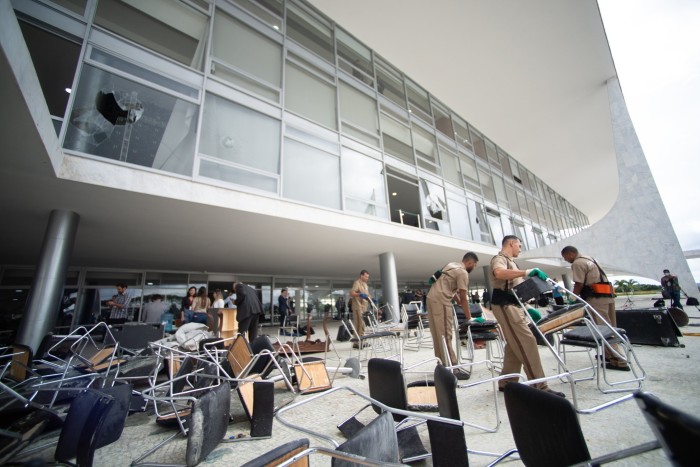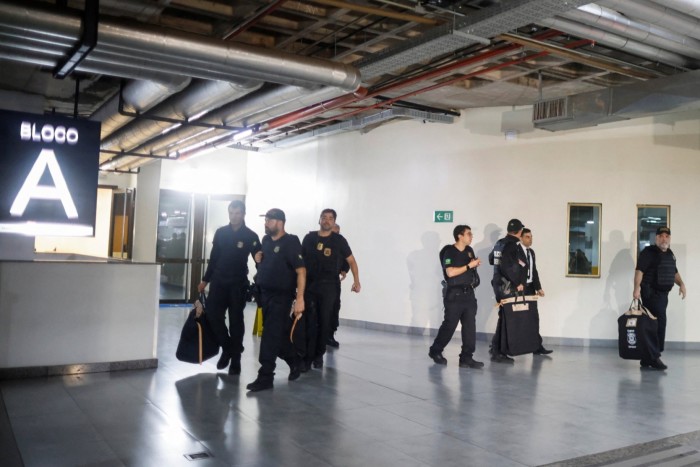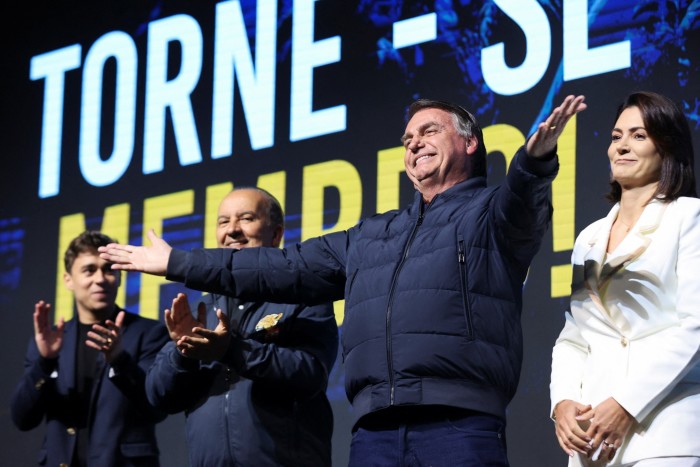
Onstage at a conservative political rally earlier this month, Jair Bolsonaro struck a defiant tone, telling a raucous crowd he would not back down in the face of multiple police investigations into his alleged misconduct in office.
“Despite the federal police going to my house and my children’s houses three times and the 300 or so cases I am facing, it has been worth it,” he told the cheering audience. “We are not going to back down.”
But the stirring rhetoric masked the hard-right former president’s increasingly perilous legal position. For the past several weeks, federal police — Brazil’s equivalent of the FBI — have been releasing details about the former president’s time in power.
Among the more sensational are allegations that he embezzled luxury gifts worth more than $1mn and that his administration created a parallel spy agency to monitor political opponents.
Commenting on the spying claims, the office of Brazil’s attorney-general this month said the espionage set-up “represented only one cell of a broader criminal organisation”.
Police are also expected in the coming weeks to recommend charges against Bolsonaro for his involvement in an alleged coup plot following the election of leader Luiz Inácio Lula da Silva in 2022.

Bolsonaro, a former army captain who was president from 2019 to 2022, has denied wrongdoing in all the cases and has sought to frame the investigations as political persecution — a message that has resonated with his Christian nationalist base.
But crime experts and political analysts see a careful police strategy of drip-feeding revelations to maximise pressure on the former president, while preventing him from becoming a political martyr.
“We have [several] very complicated cases and the way they are being conducted is creating a tightening siege around Bolsonaro,” said Leandro Consentino, a political scientist and professor at Insper in São Paulo.
Rafael Alcadipani, a crime expert at the Getulio Vargas Foundation, said the drip-feeding of information was an “investigation strategy that the federal police have chosen”.
“It is a very competent police force that has a track record with these types of cases,” he said. He recalled how police investigators built public pressure against politicians by selectively releasing information during the “Car Wash” corruption investigation — a decade-old, years-long probe into a bribery scheme between politicians and business leaders.

Pressure on the 69-year-old former leader began building in March this year when police recommended he be indicted for allegedly forging his Covid-19 vaccine certificate. Investigators claim he did this during the pandemic in order to travel to the US, which had strict entry requirements at the time.
Then, earlier this month, police said they were recommending another indictment, this time over the so-called “jewels case”.
They claim the former leader received luxury gifts — including a Rolex watch, cufflinks and gold-plated ornaments — from Gulf state dignitaries and did not disclose them officially. He then allegedly dispatched aides on government planes to try to sell the goods in the US.
Days after the claims — which political opponents were quick to call corruption — police revealed details about how Brazil’s national intelligence agency created a parallel structure to spy on Bolsonaro’s political opponents during his administration. Among dozens allegedly targeted were supreme court justices, the speaker of the lower house of Congress, and prominent journalists.
Police also claimed the spy agency sought to impede investigations into the former president’s son, Flávio Bolsonaro, a senator who had been accused of embezzling public money. The case against Flávio Bolsonaro was subsequently rejected by a court after much of the evidence was annulled over procedural mis-steps.
In both the jewels and vaccine certificate cases, federal prosecutors must now decide whether to formally indict Bolsonaro. The allegations of spying — as well as separate claims that he conspired with senior military officers to try to overturn the 2022 election results — are awaiting further investigation by federal police.
“Given the volume of issues, it will undoubtedly cause political damage to Bolsonaro,” said Consentino.
Alcadipani said the accumulation of investigations and evidence made it almost certain Bolsonaro would be arrested.
The former president has been barred from running for political office until 2030 since the electoral court in June last year convicted him of abusing his presidential powers and misusing official media in the run-up to the 2022 polls.
Bolsonaro has used this ban, as well as the mounting police investigations, to claim he is being politically persecuted — a tactic that analysts say keeps his base mobilised.
“It is an effective way to maintain support, especially among his most loyal followers. [But] it is not a strategy that will somehow increase his popularity,” said Rafael Cortez, a partner at consultancy Tendências.

Bolsonaro has long attracted comparisons with Donald Trump, another rightwing politician facing multiple legal cases that the former US president claims are a “witch hunt”. Bolsonaro said this month he hopes Trump will be returned to the White House in November polls; he has also compared this month’s assassination attempt on the US Republican with the stabbing he himself suffered on the campaign trail in 2018.
Despite the legal maelstrom, Bolsonaro appears to be maintaining popular support among right-leaning voters, a development that has been attributed to the country’s entrenched polarisation.
In March polling by Paraná Pesquisas found him to be slightly more popular than Lula, with 37.1 per cent support against Lula’s 35.3 per cent, though the difference was within the margin of error.
Bolsonaro only narrowly lost the 2022 election and in recent months has been touring the country, lending rhetorical support to political allies ahead of October’s local elections.
He has become close to Tarcísio de Freitas, the rightwing governor of São Paulo state, who is widely tipped to contest presidential polls in 2026.
Analysts believe that — if combined with a potential friendly Trump presidency in the US — a de Freitas victory in Brazil could dramatically reduce the political and legal pressure on Bolsonaro.
Local media have also reported that several family members, including his wife Michelle and sons, are considering running for the senate in 2026. If they succeed, this would also boost the former president’s position.
“There is still hope,” said Michelle Bolsonaro at the conservative rally earlier this month. “The right is fostering leaders to lead our country, which is so blessed but is just being mismanaged.”
Additional reporting by Beatriz Langella